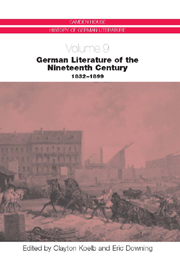Book contents
- Frontmatter
- Contents
- Illustrations
- Introduction
- Part I Contexts
- Part II Movements
- Part III Genres
- The Absence of Drama in Nineteenth-Century Germany
- The Nineteenth-Century German Novel
- Between Sentimentality and Phantasmagoria: German Lyric Poetry, 1830–1890
- Richard Wagner: Opera and Music Drama
- Part IV Bibliographical Resources
- List of Primary Sources
- Selected Secondary Works Cited
- Notes on the Contributors
- Index
Richard Wagner: Opera and Music Drama
from Part III - Genres
Published online by Cambridge University Press: 05 February 2013
- Frontmatter
- Contents
- Illustrations
- Introduction
- Part I Contexts
- Part II Movements
- Part III Genres
- The Absence of Drama in Nineteenth-Century Germany
- The Nineteenth-Century German Novel
- Between Sentimentality and Phantasmagoria: German Lyric Poetry, 1830–1890
- Richard Wagner: Opera and Music Drama
- Part IV Bibliographical Resources
- List of Primary Sources
- Selected Secondary Works Cited
- Notes on the Contributors
- Index
Summary
The old chestnut that more has been written about Richard Wagner (1813–83) than any historical figure bar Napoleon and Jesus Christ has been debunked many times. But legends are durable, and this one has been given a new lease of life thanks to the plethora of websites devoted to Wagner: typing the names of these three historical figures into a search engine will quickly reveal how widely this claim has been disseminated. The important point, of course, is not the veracity of the assertion, but the fact that it proves so popular. That such an exaggerated claim continues to flourish says something about the aura surrounding “der Meister” (as he was once known to his most ardent followers) and the hyperbole with which his name is associated, not least in Germany, where Wagner‘s quarrelling descendants can still generate more than their fair share of column inches in the national press.
In retrospect, the emergence of the Wagner phenomenon has an inevitability to it. Wagnerian theater is nothing if not extreme — in scale, in scope, in intensity — and the fact that it generated cultic enthusiasm is no more surprising than the (equally vigorous) hostility with which it was confronted. The one fate that Wagner‘s work has been spared is lack of interest. The cultural climate that nurtured Wagner‘s gargantuan and arrogant ambitions also granted an audience sympathetic to its pretensions and willing to subject itself to the considerable mental and physical rigors of five-hour music dramas.
- Type
- Chapter
- Information
- German Literature of the Nineteenth Century, 1832–1899 , pp. 251 - 278Publisher: Boydell & BrewerPrint publication year: 2005



